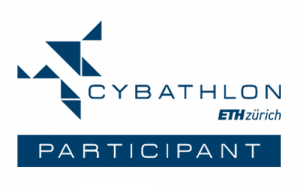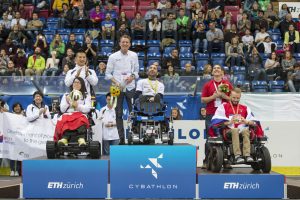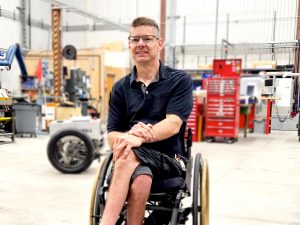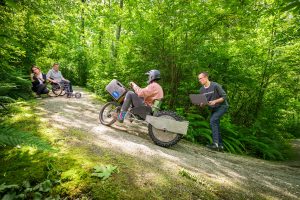 On October 26 and 27, Dr. Jaimie Borisoff, Director of BCIT MAKE+ and former Canada Research Chair in Rehabilitation Engineering Design, will lead the BCIT MAKE+ 2024 CYBATHLON Team to compete in the Wheelchair Race category at the prestigious CYBATHLON taking place in Zurich, Switzerland. The CYBATHLON, a global competition founded by ETH Zurich in 2016, draws more than 100 teams of engineers and technologists from over 30 countries around the world to compete across 10 categories. The event aims to break down barriers between the public, individuals with disabilities, and technology developers, while showcasing how innovative assistive technologies can empower people with physical disabilities to perform everyday tasks, such as tying shoelaces with robotic arms or navigating uneven terrain with exoskeletons.
On October 26 and 27, Dr. Jaimie Borisoff, Director of BCIT MAKE+ and former Canada Research Chair in Rehabilitation Engineering Design, will lead the BCIT MAKE+ 2024 CYBATHLON Team to compete in the Wheelchair Race category at the prestigious CYBATHLON taking place in Zurich, Switzerland. The CYBATHLON, a global competition founded by ETH Zurich in 2016, draws more than 100 teams of engineers and technologists from over 30 countries around the world to compete across 10 categories. The event aims to break down barriers between the public, individuals with disabilities, and technology developers, while showcasing how innovative assistive technologies can empower people with physical disabilities to perform everyday tasks, such as tying shoelaces with robotic arms or navigating uneven terrain with exoskeletons.

As participants competing in the Wheelchair Race category, the BCIT MAKE+ Team is tasked with designing a power wheelchair with advanced capabilities. The wheelchair is to navigate obstacles, such as single steps, flights of stairs, uneven terrain, and other daily challenges that individuals with severe walking disabilities face. The race highlights the importance of developing technologies that enhance mobility and independence for wheelchair users. With their sights set on the wheelchair race, the MAKE+ Team aims to showcase innovative advancements in mobility solutions for individuals with disabilities.
Introducing the power wheelchair: BEAST (BCIT Extending Articulating Wheelchair for Serious Terrains)
The team developed some novel technologies including a drive system that uses a brushless DC motor and a reduction stage to provide the output torque required to handle stairs and obstacles. They also developed a steer by wire system that uses a traditional bicycle handlebar and a series of sensors to decouple the steering from the end wheel meaning any kind of control, like a joystick or sip and puff, can be used to steer thereby accommodating users with differing capabilities.
Why enter the CYBATHLON?

For the BCIT MAKE+ Team, participating in the CYBATHLON aligns perfectly with their mission and expertise. As former Canadian Research Chair in Rehabilitation Engineering Design at BCIT and, now, Director of the MAKE+ applied research team, Dr. Borisoff has devoted his career to improving accessibility and mobility for individuals with spinal cord injuries (SCI). His research focuses on improving lives through dynamic wheeled mobility, adapted exercise machines, and other assistive technologies.
“Competing in the CYBATHLON is a natural extension of our work,” says Dr. Borisoff. “BCIT MAKE + has been developing better assistive technologies for over a decade, particularly around wheelchair design. The CYBATHLON fosters research and innovation, pushing us to explore new frontiers, while also providing rigorous challenges and deadlines that force us to create feasible and practical devices.”
Preparation and innovation for the long game
The MAKE+ Team is taking a long-game approach in their preparation for the 2024 CYBATHLON. “For the 2024 competition, we will be entering an unconventional power wheelchair,” explains Dr. Borisoff. “However, when designing various components, we’re keeping in mind our broader goal: to eventually develop modular attachments for manual wheelchairs.”
“Our aim is to enter a power wheelchair competition using a manual wheelchair with these attachments,” adds Dr. Borisoff. “It’s an exciting yet challenging goal, and we hope to take a device like this to the 2028 CYBATHLON.”
The journey to developing a hybrid-manual wheelchair
Entering the CYBATHLON competition is one part of a larger project that Dr. Borisoff and the team have been working on to develop new hybrid-manual wheelchairs with expanded features and capabilities. These new features will allow users to navigate more difficult situations like off-road trails and snowy terrain, and tackle more difficult obstacles. These systems will be tested in several ways, including at the CYBATHLON.
The ups and downs on the road to the CYBATHLON

Preparing for the CYBATHLON is a journey of both breakthroughs and challenges for the MAKE+ Team. One memorable moment was the successful test of their wheelchair climbing a staircase, a task that required significant power and stability. However, setbacks such as mechanical failures have also provided valuable learning experiences. “We don’t see failures as negatives,” says Dr. Borisoff. “Each setback teaches us something new and helps us refine our designs.”
Promoting inclusion and raising awareness
The CYBATHLON plays a crucial role in raising awareness about disability and promoting inclusivity. Just as the Paralympics highlight the capabilities of athletes with disabilities and make host cities more accessible, the CYBATHLON showcases the potential of assistive technologies, leads to new product innovation, and fosters greater awareness about societal barriers as well as the capabilities of people – since each entrant requires a “pilot”, who represents actual users of the technology being showcased, to navigate the CYBATHLON course. As the MAKE+ Team gears up for the competition, BCIT and the broader community are rallying behind them, highlighting the importance of their work and its implications for people with disabilities worldwide.
Participation in CYBATHLON also amplifies the potential of polytechnics like BCIT in significantly increasing its contribution to Canada’s applied research ecosystem, as well as to increase the rate of innovation and productivity growth in the Canadian economy. According to the Economic Impact of Applied Research at Canada’s Polytechnics report, every dollar invested in polytechnic applied research generates a return on investment from a low estimate of $8.09 to a high of $18.49. The social return on investments in applied research exceeds the private return.
Follow the BCIT MAKE+ team at CYBATHLON
Follow the MAKE+ Team’s journey to the 2024 CYBATHLON, where innovation meets competition to break down barriers and enhance lives.
About MAKE+
MAKE+ makes lives better through creative solutions powered by interdisciplinary applied research. By collaborating with local stakeholders, including industry partners, academic institutions, and students, MAKE+ develops technologies that make a difference. The group’s expertise includes medical devices, consumer and industrial technology development, standards and process development, and mechatronics design and prototyping.
As the only academic applied research group in Canada operating under an ISO 13485 (Medical Devices) Quality Management System, MAKE+ ensures a rigorous product development and applied research process. The MAKE+ user-focused innovation model leads to safe, effective, and market-ready solutions that make lives better globally. Learn more about MAKE+ and their innovative projects.
Note to media:
High-resolution photos and b-rolls available. Dr. Jaimie Borisoff, Director of BCIT MAKE+ and former Canada Research Chair in Rehabilitation Engineering Design, is available for media interview. Show-and-tell opportunities of the wheelchair in action available. Please contact Amy Chen to schedule.
